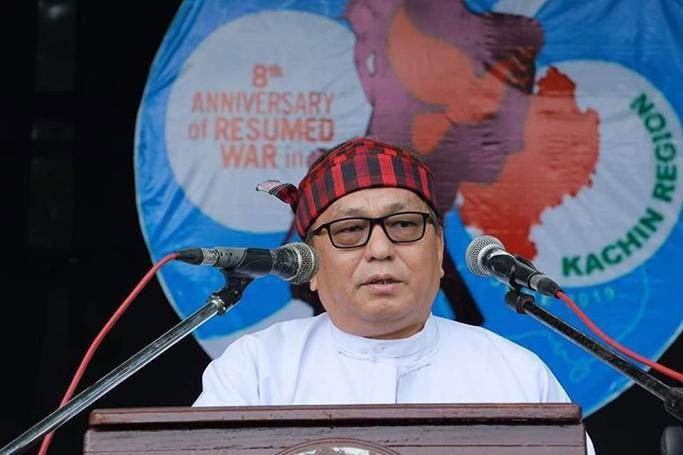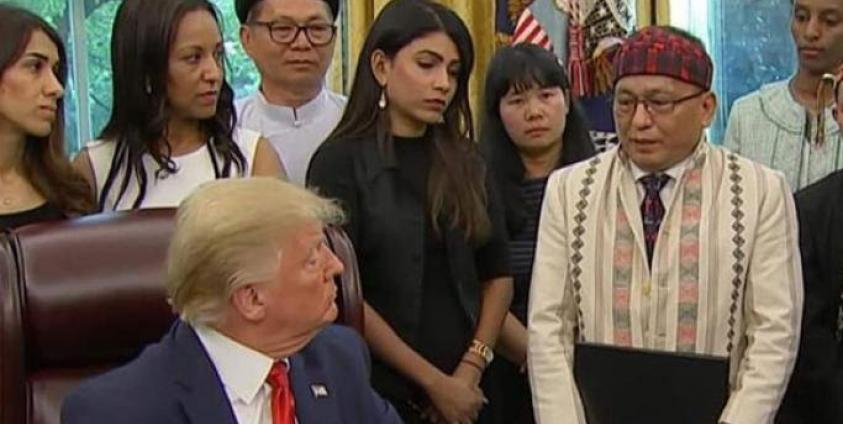It is indeed a welcome move from the part of military or Tatmadaw to withdraw its lawsuit on Kachin Baptist Convention (KBC) Chairman Reverend Hkalam Samson, which was based on defamation clause said to be committed by the Reverend during his meeting with the United States President Donald Trump in Washington DC, on July 17.
The KBC is a congregation of some 400,000 members and an influential and respected Christian organization.
Reportedly, he was said to have told Trump there is no religious freedom in Myanmar and that oppression and torture are still common in the country; urged him to support Myanmar’s transition to “genuine” democracy and federalism; and thanked the United States for imposing visa sanctions against Myanmar military commander-in-chief Senior-General Min Aung Hlaing and other leaders over extrajudicial killings of Rohingya people.
The lawsuit filed by Lieutenant-Colonel Than Htike from the Tatmadaw’s Northern Command with the Myitkyina Township Court on August 26 was scheduled for decision, on how it should be handled, on September 9.
Accordingly, Myitkyina Township Court judge Than Tun said the plaintiff, Lieutenant-Colonel Than Htike, had withdrawn his legal complaint against the Reverend Samson. He told the media that the court would not proceed with any legal action against Samson, in accordance with the will of the plaintiff.
Reverend Samson reasoned according to the media that his statement on thanking Trump the visa sanctions on the four military leaders might have angered the Tatmadaw.
Nevertheless, he told the media that he welcome the Tatmadaw’s decision and that there has been no negotiation whatsoever to resolve the case.
In the same vein, Tatmadaw’s true news information team spokesman Brigadier-General Zaw Min Tun also said that the case withdrawal was on Tatmadaw’s own free will and there has been no outside pressure.
While the Tatmadaw’s withdrawal of the case against Reverend Samson is an appropriate move, praiseworthy and should be rejoiced, the civilian-military regime as a whole in the future should refrain from using draconian and repressive laws to sue its critiques and those who are vocal against them, with the collaboration of the judiciary.
Moreover, the judiciary should be helped and empowered to be independent as much as possible in making profound decision, which so far has been viewed and believed to be taking orders from the powers-that-be in Naypyitaw.

KBC Chairman Rev. Dr. Hkalam Sanson. Photo: shadan zau hpring/Facebook
And as such, it should screen all the lawsuits, particularly those coming from the civilian-military regime and its affiliations with political agendas to silent its critiques and oppositions, from the rule of law point of view and individual freedom of expression and not acting as a subordinate entity to the powers-that-be. The balance of power between the executive, legislative and judiciary will have to be encouraged and maintained if the country is ever to be democratized.
Regardless of a happy-ending case of Reverend Samson, we should not forget that as of July statistics by Assistance Association for Political Prisoners (Burma) there are 513 individuals oppressed in Burma due to political activity, 41 currently serving prison sentences, 175 awaiting trial inside the prison, and 297 awaiting trial outside the prison.
In concrete terms draconian laws such as Unlawful Associations Act Sections 17(1) and 17(2); Peaceful Assembly and Peaceful Procession Law (PAPPL); Telecommunications law Section 66(d) and so on should be screened and used sparingly, so that freedom of expression could be upheld as much as possible and independence of judiciary observed, even if they cannot be repealed or amended to be more humane for the time being.






